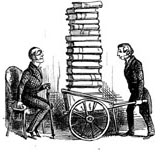
Universal Knowledge: The Secret of Happiness
"THE SHORTNESS OF OUR PRESENT STATE"
In a consumerist society where happiness is equated with the acquisition of material things, in a hedonistic society where happiness is associated with the accumulation of comforts and pleasures of the flesh, in a politically correct world where happiness follows from tolerance and diversity, in a political realm where the pursuit of happiness is envisioned in terms of more individual rights and choices, in corporate America where happiness is measured in terms of wealth and profits, and in an academic environment where happiness is equated with degrees, publications, and prestige, the truth about authentic human happiness is forgotten.
Imlac, the poet and sage in Samuel Johnson’s Rasselas, states, “we grow more happy as our minds take a wider range….” He explains, “I am less unhappy than the rest, because I have a mind replete with images, which I can vary and combine at pleasure…. In other words, happiness is a particular state of mind, not economic status, the satiation of pleasure, worldly honors, moral neutrality, or an island paradise. A mind that takes “a wider range… transcends the narrowness of specialization, pedantry, and small-mindedness. A mind “replete with images… incorporates knowledge from many sources: travel and experience, books and learning, encounters and conversations with people from all walks of life. Obsession with money, sports, honors, entertainment, or fashion does not expand the mind to a “wider range… or a sense of the universal, and the politically correct notion that all truth is relative contradicts the idea of an enduring, perennial wisdom. A mind that takes “a wider range… also transcends the bias of what C.S. Lewis termed “chronological snobbery… — the fashionable notion that only the latest opinions are relevant.
In Johnson’s short novel, Rasselas, the prince of Abissinia, lives in Happy Valley, which appears to be a utopia. Physical comfort, pleasure, and luxury surround him: “Every desire was immediately granted. All the artificers of pleasure were called to gladden the festivity; the musicians exerted the power of harmony, and the dancers showed their activity before the princes……. Yet the prince is restless, melancholy, and bored in this narrow, confined world: “But possessing all that I can want, I find one hour exactly like another, except that the latter is still more tedious than the former…. His mind enjoys neither a wide range nor a variety of images. Unoccupied and passive, Rasselas lacks a goal and any purpose. Having nothing to look forward to in the future and needing “something to pursue,… he cries out, “give me something to desire…. A healthy state of mind, then, that increases human happiness requires an enlarged view of the whole of reality; requires variety, contrast, and change that engage the mind and provide it with a new supply of images; requires the anticipation of fulfilling some important goal. In the repetitious life in Happy Valley, Rasselas’s mind is jaded with the same stale images. Confined to a valley surrounded by vast imprisoning mountains, Rasselas does not participate in the wider world. Idling in Happy Valley, the prince strives for no goal. Because nature abhors a vacuum, a mind that is not replete with images is soon filled with an uncontrollable imagination that invents daydreams: “The mind dances from scene to scene, unites pleasures in all combinations, and riots in delights which nature and fortune, with all their bounty, cannot bestow…. Rasselas fantasizes that perfect happiness lies somewhere beyond the mountains, that an escape from Happy Valley will lead to heroic adventures in which good always triumphs over evil.
You May Also Enjoy
Pledging Allegiance... No Horsing Around... The Heights of Relaxation... Meat in a Minute... A King’s Ransom... Too Cute for the Can... and more
A Media Witch Hunt Against Catholic Clergy... Not For the Faint of Heart... Chris Conlee's Unhappy Article... The New Vernacular Mass Is Just Plain Annoying... John Michael Talbot & Eastern Religions... Are Vaccines Safe?...
With the collapse of “Christendom” and the rise of the Third World, the Church in our day is beginning to see the Gospel apart from a European matrix.

